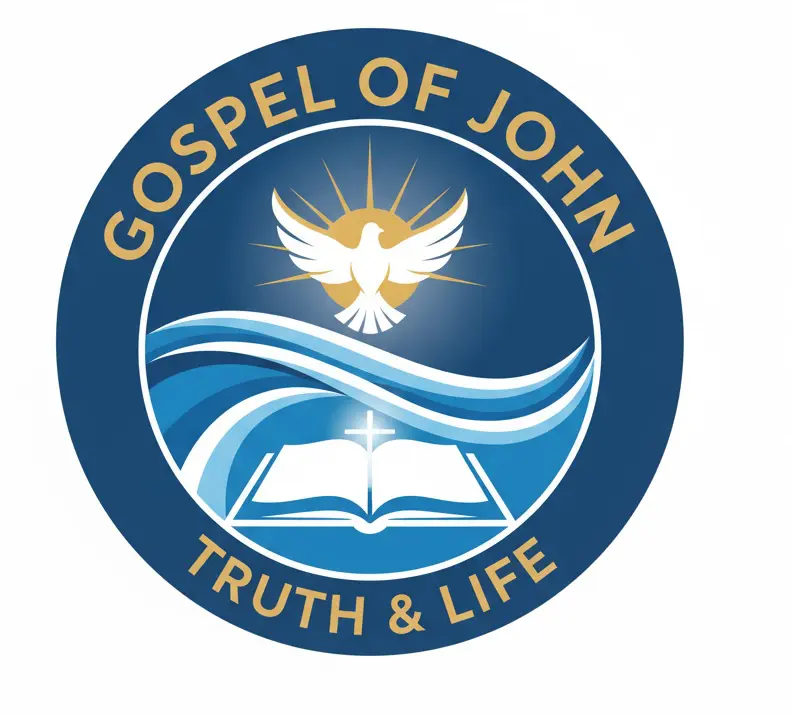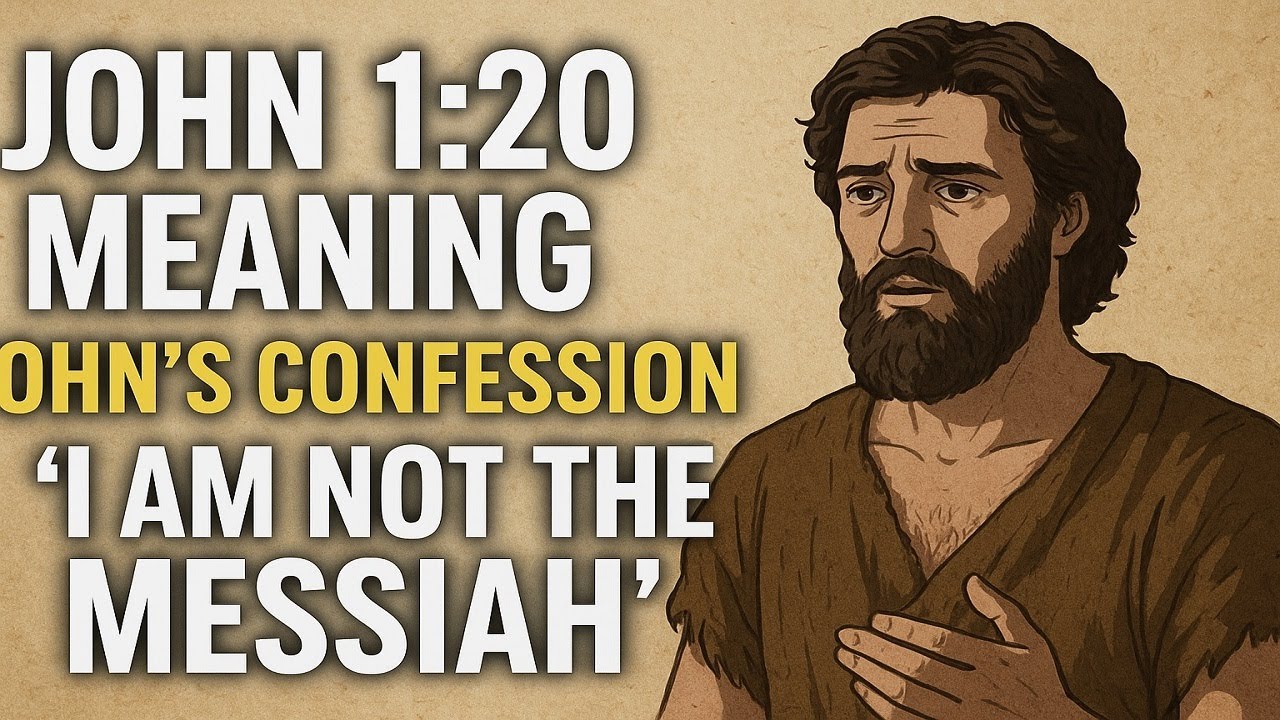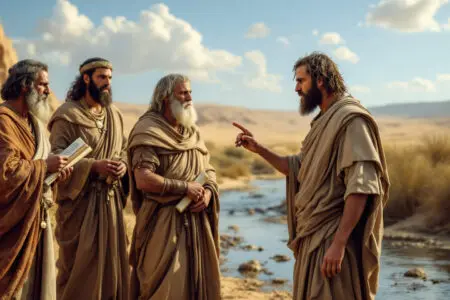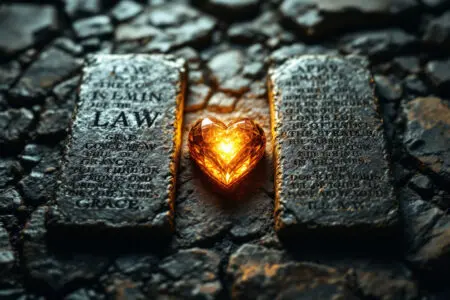There are moments that define you, not by what you claim to be, but by what you publicly declare you are not. It’s a rare and powerful display of integrity. I was put in a similar, albeit much smaller, situation years ago. I was part of a major project at work, and things were going exceedingly well. A senior executive, thrilled with our progress, started directing all his praise and questions to me during a big team meeting, assuming I was the project lead.
For a split second, I’ll admit, the ego boost felt incredible. But it wasn’t my success to claim. My colleague and friend, David, was the true architect of the project. I had to speak up. “Thank you,” I said, cutting through the murmurs, “but David’s the one leading this charge. I’m just clearing the path for him.” It was a simple correction, but it was vital for our team, for my friendship with David, and for my own conscience. That moment always brings me back to the stark clarity of John the Baptist.
Staring down his own moment of potential glory, with crowds hanging on his every word, he made a declaration for the ages. Today, we’re going deep on the John 1:20 meaning, a verse that hits with profound theological weight and raw human drama.
More in John Chapter 1 Category
Key Takeaways
- A Deliberate, Forceful Confession: John’s statement, “I am not the Messiah,” wasn’t just a simple denial. The structure of the verse in the original Greek reveals a solemn, public, and legally binding declaration intended to crush any and all doubt.
- A World Holding Its Breath: The Jewish people were crushed under Roman rule and were desperately scanning the horizon for the promised Messiah. This intense political and religious climate is the reason the priests and Levites were so urgently grilling John.
- Humility in the Spotlight: At the absolute peak of his popularity, John could have seized immense power. His refusal shows a stunning humility and a laser-focused understanding of his mission: he was the witness, not the main event.
- Defining by Negation: By forcefully stating who he was not—the Messiah, Elijah, or the Prophet—John carved out a space of pure anticipation. He was priming the world to truly hear Jesus’s own powerful “I am” statements.
- A Model for Modern Faith: John’s confession is a challenge to us today. It calls us to find freedom in our specific, God-given roles, to point people toward Christ instead of craving the spotlight, and to grasp that our greatest purpose is often found in championing God’s work in the world.
Why Did Everyone Suddenly Need to Know Who John Was?
To feel the gravity of John’s words, you have to picture the scene. This wasn’t some casual fireside chat. This was an official delegation, a high-stakes inquiry sent straight from the top religious brass in Jerusalem. Imagine a group of stern-faced priests and Levites, the temple’s own security, trekking all the way out to the raw, untamed wilderness of the Jordan River. You don’t make a trip like that for just anybody.
John’s ministry was a stone tossed into the still pond of Jerusalem’s religious establishment, and the ripples were turning into waves. He was pulling in massive crowds, people from every station in life, captivated by his searing sermons and his radical call to repent. He was performing a baptism that was deeply symbolic, a cleansing ritual that hinted at something new on the horizon—a new covenant, a new movement of God. In a land simmering with rebellion, a popular movement like this was a powder keg. It could not be ignored.
What Was the Political and Religious Climate Like at the Time?
You have to understand, first-century Judea was a pressure cooker. The Jewish people were living under the boot of the Roman Empire. Their sacred land was occupied, their freedoms were squeezed, and they were bled dry by taxes paid to a foreign pagan emperor. This daily humiliation fanned the flames of a desperate hope for a deliverer.
For generations, their prophets had spoken of a coming king, an “Anointed One”—in Hebrew, Mashiach, or Messiah. This figure, they believed, would be a descendant of the great King David. He would overthrow their oppressors, restore Israel to its former glory, and rule the world in justice. By the time John appeared, this hope had reached a fever pitch. People were searching everywhere, looking for a sign that their savior was finally here. Every preacher with a spark of authority, every leader who drew a crowd, was intensely scrutinized. Could this be the one? The question wasn’t just a religious one; it was a deep, political, and existential cry for freedom.
Did John’s Ministry Actually Look Messianic?
You bet it did. From the outside looking in, John was checking a lot of the boxes. He preached with an authority that made the religious elite uncomfortable. He fearlessly called out sin at every level of society, even publicly condemning the local ruler, Herod Antipas, for his illicit marriage. This was the kind of fearless courage people expected from a true prophet of God.
Beyond that, his message of repentance was seen as the necessary groundwork for the Messiah’s arrival. The crowds pouring out to him, confessing their sins, and being washed in the Jordan looked like the start of the great national turning-back-to-God that was supposed to kick off the Messianic age. People were getting swept up. They were ready for a revolution, and John looked like just the man to lead it. The authorities in Jerusalem saw the smoke and sent a delegation to find the fire. They had to know: who is this man, and what is he claiming?
So, What Does John’s “Confession” Really Tell Us?
This brings us right to the verse. John 1:20 states, “He confessed, and did not deny, but confessed, ‘I am not the Christ.'” It sounds repetitive, doesn’t it? Why say it three times? This isn’t sloppy writing. The author, John the Apostle, is using a powerful rhetorical device to underscore the absolute, unshakeable finality of the statement.
In the original Greek, the word used for “confessed” is homologeó. This isn’t just admitting a secret. It means to declare something publicly, to state it as a matter of official record, almost like testifying in court. The triple structure—”He confessed… did not deny… but confessed”—is designed to obliterate any shred of doubt. There was no hesitation in his voice, no room for misinterpretation. He was slamming the door on the single most intoxicating temptation a man in his position could ever face.
It was a definitive, public declaration. He was drawing a line in the desert sand for all to see.
I had a moment like this, on a much smaller scale, a few years back at work. A new initiative was launching, causing a lot of confusion about who was in charge. I was leading one small piece of it, but because I was vocal and excited, rumors started spreading that I was being promoted to run the entire department. The whispers were flattering, but they were also creating chaos and undermining the actual leader, a talented woman named Sarah.
I knew I had to kill the rumor. I pulled my team together and said, “Let me be crystal clear. I’m thrilled with my role, but I am not in charge of this new department. Sarah is our leader. Let’s get behind her.” I had to confess who I was not so the real mission could move forward. It was about choosing clarity over ego. John’s confession was that same principle, magnified to a divine level.
If He Wasn’t the Messiah, Who Did They Think He Was?
The delegation from Jerusalem came with a specific checklist. If he wasn’t the Messiah, then surely he must be one of the other major figures they were anticipating. Their follow-up questions reveal the very specific hopes that were buzzing through the nation.
Could He Have Been Elijah?
Their first guess was Elijah. This wasn’t a shot in the dark. It came directly from a famous prophecy in the book of Malachi, the final book of the Old Testament. Malachi 4:5 promised, “Behold, I will send you Elijah the prophet before the great and awesome day of the LORD comes.”
For centuries, Jewish tradition held that the great prophet Elijah, who never died but was taken up to heaven, would physically return to prepare the way for the Messiah. John fit the description perfectly. He operated out in the wilderness, wore camel’s hair and a leather belt just like Elijah (2 Kings 1:8), and preached a blistering message of judgment. He was the classic Old Testament prophet reborn. It was a perfectly logical conclusion. Yet John’s answer was a blunt, “No.”
What About “the Prophet”?
Their next guess was, “Are you the Prophet?” This points to another key prophecy, this one from Deuteronomy 18:15, where Moses promised, “The LORD your God will raise up for you a prophet like me from among you… it is to him you shall listen.”
This “prophet like Moses” was expected to be a legendary teacher and miracle-worker, another key player in the end-times drama. While ideas about this figure varied, many considered him distinct from the Messiah and Elijah. He was another piece of the puzzle. For the third time, John’s answer is a single word: “No.” He systematically rejected every title they offered. He refused any crown but the one God had given him.
Why is John’s “No” So Incredibly Powerful?
John’s repeated denials are the bedrock of his entire ministry. His power lies not in what he claims for himself, but in what he refuses. At the zenith of his influence, with a desperate nation ready to follow him anywhere, he deliberately steps out of the spotlight. This is where you see his true character.
How Does This Confession Reveal John’s Radical Humility?
True humility isn’t thinking less of yourself; it’s thinking of yourself less. John the Baptist is the poster child for this. He had a perfectly clear understanding of who he was and, just as crucially, who he was not. His identity was completely consumed by his mission, and that mission was never about him.
Imagine the temptation. The power was his for the taking. He could have used his fame to build a political movement, to gain wealth, to become a legend. He could have easily rationalized it. But his integrity was unbending. He knew his job was to shrink so that another could grow. His greatest joy, as he says later, was simply to be the best man at the wedding, standing by and hearing the bridegroom’s voice. He found his significance in making someone else significant.
What Does It Mean to Be a “Witness”?
After shooting down every grand title, John finally tells them who he is: “I am the voice of one crying out in the wilderness, ‘Make straight the way of the Lord'” (John 1:23). That’s his whole job description. He’s not the message; he’s just the messenger. He’s not the light; he’s the one who points to the light.
The Greek word for “witness” is martus. It’s where we get our word “martyr.” It carries the idea of a testimony so true and so deeply held that you’re willing to die for it—which, of course, John eventually did. His entire life was an arrow pointing away from himself and toward Jesus.
I’m reminded of coaching my son’s little league team. We had a shortstop, Leo, who was loaded with natural talent but crippled by self-doubt. My whole job that season was to be his witness. I would pull him aside and point out the amazing plays he was making. I’d praise his hustle in front of the whole team. When he made a mistake, I’d defend him. I spent hours hitting him grounders, telling him again and again, “You’ve got this.”
I wasn’t the one on the field. My name wasn’t in the paper. But when he made the game-winning catch in the championship, my joy was explosive. It was a joy born from witnessing his success. That, I think, is a small taste of the joy John felt.
How Did John’s Denial Set the Stage for Jesus?
John’s confession was not an act of self-loathing; it was a brilliant and essential part of God’s plan. By declaring “I am not,” he created the perfect space for Jesus to arrive and declare “I am.”
His words were the drumroll before the main event. He was the opening act that gets the crowd fired up and focused on the stage, waiting for the headliner. He cleared away the fog of confusion and false expectations. No, this wild man in camel’s hair isn’t the one you’re ultimately waiting for. But get ready. He’s coming.
This work of “making straight the way” was vital. In the ancient world, before a king visited a region, a herald would go ahead to command the people to clear the path—to fill in potholes and level the rough places. John was that spiritual herald. He was clearing out the debris of false hopes and misplaced expectations to prepare a direct path for the King of Kings to enter people’s hearts. His work involved:
- Clarifying the Roles: He made it crystal clear he was the forerunner, not the final destination.
- Heightening Expectation: His incredible ministry, followed by his denial, created a powerful sense of anticipation. If this guy isn’t the one, how amazing must the real one be?
- Demonstrating True Faithfulness: John showed what it means to be faithful to your specific calling, even when a more glamorous one is offered.
- Modeling Discipleship: Before Jesus even had disciples, John was showing what it meant to follow: to make your life about pointing to Jesus.
How Can We Apply John’s Confession in Our Own Lives?
The meaning of John 1:20 isn’t just a history lesson; it’s a direct challenge. It forces us to ask tough questions about our own lives, our own ambitions. It makes us examine all the subtle ways we try to be the hero of our own story.
Are We Ever Tempted to Be the “Messiah” in Our Own Little Worlds?
It’s a deeply human instinct. We want to be the one who can fix our family’s problems. We want to be the indispensable employee who saves the project. We want to be the friend with all the answers. We try to be the savior.
But that pressure is crushing, and it’s a role we were never meant to fill. It might come from a good place, but it leads to burnout, pride, and a life where God gets pushed to the margins. John’s confession gives us permission to take off the cape. There is profound relief in saying, “I don’t have all the answers. I can’t fix this. I am not the messiah here.” True freedom isn’t found in being everything to everyone, but in being exactly who God created you to be.
What’s the Power in Knowing Who We Are Not?
There is tremendous power in embracing our limits. When you know who you are not, you are finally free to excel at who you are. A fish doesn’t find its purpose by wishing it could fly; it finds it by mastering the ocean. John knew he wasn’t the Messiah, and that freed him to become the greatest “voice in the wilderness” the world had ever heard. For more on the historical context of these messianic hopes, extensive resources can be found in academic papers, such as those cataloged by institutions like the University of Pennsylvania’s library.
Knowing our “not-ness” frees us to celebrate the gifts of others without seeing them as a threat. It allows us to serve behind the scenes with a full heart. It empowers us to point to the One who is the true answer, the true light, and the true hope of the world. It reorients our whole life from being about our glory to being about His.
John the Baptist’s confession, “I am not the Messiah,” is one of the most vital and selfless statements in Scripture. It is a thunderous declaration of humility, purpose, and faith. It perfectly sets the stage for the main character of all of history to walk into the spotlight. John’s powerful “I am not” cleared the path for the divine “I am” statements Jesus would soon make—”I am the bread of life,” “I am the light of the world,” “I am the way, the truth, and the life.”
In the end, John teaches us that our greatest legacy may not be what we build for ourselves, but who we point others to. It might not be the name we make, but the name we lift up—the name of Jesus.
FAQ – John 1:20 Meaning
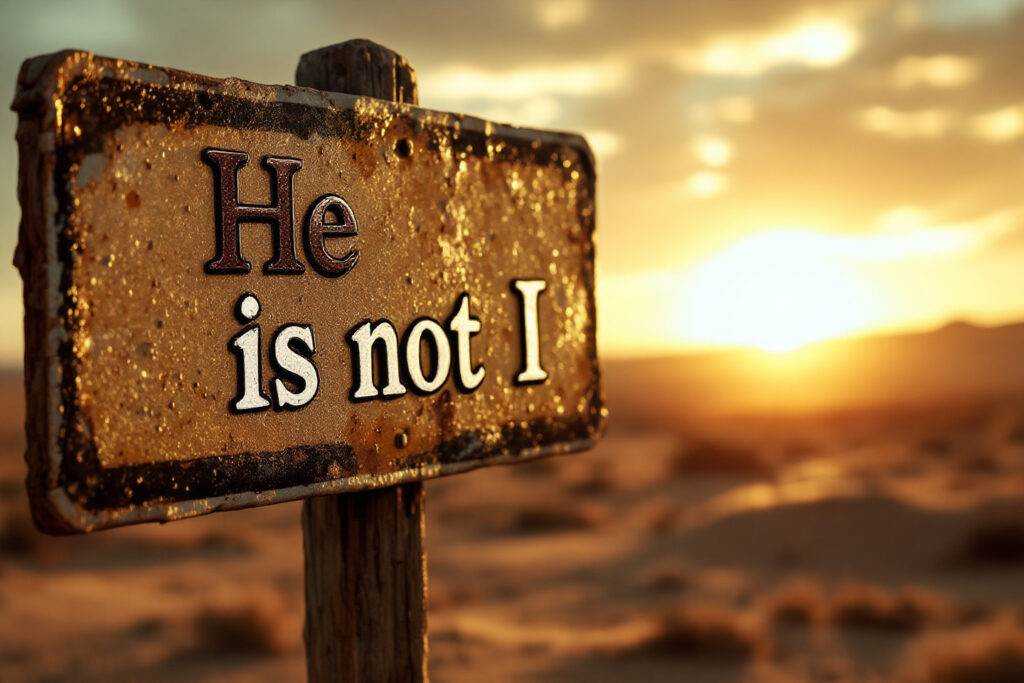
What lessons can modern believers learn from John’s humility and confession?
Modern believers can learn the importance of humility, recognizing their limits, and understanding that their role is to point others to Jesus rather than seeking personal glory. Embracing what they are not allows them to serve faithfully and focus on God’s greater purpose.
How does John’s statement help clarify his role in relation to Jesus?
John’s declaration, “I am not the Christ,” clarifies that he is a forerunner and witness rather than the Messiah himself. It helps establish the distinct roles of John and Jesus, emphasizing that John’s purpose was to prepare the way for Jesus’ entry into the world.
What cultural and political context influenced people’s perception of John and his ministry?
First-century Judea was under Roman rule, with the Jewish people longing for a Messiah to deliver them from oppression. This environment fostered high expectations of a future king and made John’s ministry appear messianic, fueling widespread anticipation and scrutiny.
Why did the Jewish religious leaders seek to identify John so urgently?
The religious leaders were eager to identify John because his ministry was drawing large crowds and challenging the established religious and political order, especially during a time of Roman occupation and messianic hope. His bold message signaled a significant movement that could influence the nation’s future.
What is the significance of John’s repeated confession in John 1:20?
John’s repeated confession, “I am not the Christ,” emphasizes the solemnity and clarity of his denial, using a powerful rhetorical structure to remove any doubt about his identity. This public declaration highlights his humility and focus on his mission to point to Jesus.
